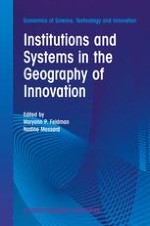2002 | OriginalPaper | Buchkapitel
The Knowledge Dilemma and the Geography of Innovation
verfasst von : Dominique Foray, Jacques Mairesse
Erschienen in: Institutions and Systems in the Geography of Innovation
Verlag: Springer US
Enthalten in: Professional Book Archive
Aktivieren Sie unsere intelligente Suche, um passende Fachinhalte oder Patente zu finden.
Wählen Sie Textabschnitte aus um mit Künstlicher Intelligenz passenden Patente zu finden. powered by
Markieren Sie Textabschnitte, um KI-gestützt weitere passende Inhalte zu finden. powered by
In this chapter we review the three properties that qualify knowledge as an economic good and determine the main dilemma of the economics of knowledge —the onflict between the social goal of efficient use of knowledge once it has been produced and the goal of providing ideal motivation to the private producer. To fully grasp the implications of each property, we consider in the first section the extreme case of codified knowledge (appearing in the form of a manual of codified instructions) for which those properties are very strong. Such a case generates a kind of very pure world in which we can see very clearly the economic problems of public-good and knowledge dilemma. This, however, is a world without geography: similar to radio transmission signals or air pollution, knowledge is considered to be absorbed without cost by all agents in the economy. We will progressively qualify this fiction to show to what extent the public good problem is reduced as we get away from the extreme case of knowledge defined as
